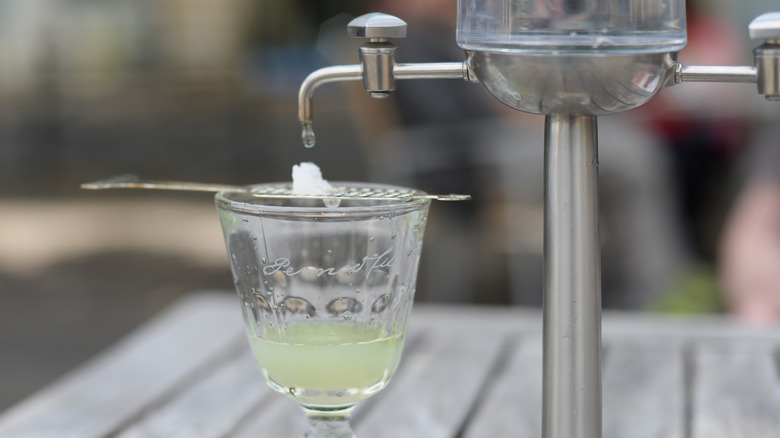The Reason Absinthe Is Sometimes Cloudy
Ah, the Green Fairy — with its distinctive green color, a history of being banned in many countries in the early 1900s, and rumors that it causes hallucinations and madness (via Liquor), there's a definite air of mystery around absinthe. Traditionally made with anise, fennel, and wormwood, absinthe is known for its unique herbal flavor, and tends to have a high alcohol content of between 55 and 75%, according to How Stuff Works.
A popular way of drinking absinthe is to drip chilled ice water over a sugar cube on a slotted spoon placed over a glass of absinthe, explains Bon Appétit. And as anyone who's ever added a bit of water to absinthe knows, the resulting concoction often turns an opaque and cloudy white color, and will stay that way for a long time (via Serious Eats), adding yet another layer of mystery to this intriguing drink. So what causes absinthe to turn cloudy? The phenomenon itself is called the louche, and the answer to that question can be found in science, and in two of the main herbs that absinthe is typically infused with.
Essential oils in absinthe are responsible for the louche
Both anise and fennel contain essential oils with a primary compound called anethole (via ScienceDirect). Anethole is hydrophobic, meaning it is not soluble in water, but it is "soluble in ethanol," clarifies the American Chemical Society. When you start adding water, however, you start diluting the ethanol. With enough water added, there is no longer enough ethanol to keep the essential oil in solution, and it forms an emulsion instead, with tiny droplets that are just big enough to scatter the visible light waves, "making the drink appear opaque," explains The Guardian.
So, there's nothing to worry about if your absinthe turns cloudy once you add a bit of water. In fact, a good louche is a sign of quality when it comes to absinthe, according to Difford's Guide, as it means the absinthe contains a lot of anise. Nor is absinthe the only liquor that louches. Any anise-based liquor, which includes the likes of ouzo (which is responsible for the louche's other name, "the ouzo effect"), pastis, raki, and arrak, will also louche when water is added (via VinePair).

